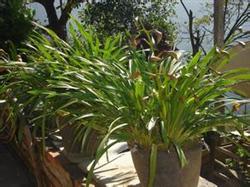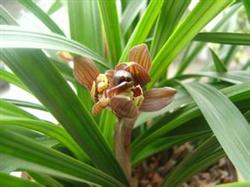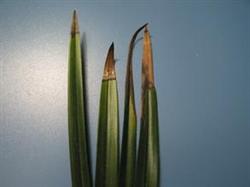How to raise orchids in summer

Summer is the hot season of the year, often with muggy weather of about 35 ℃. The climate is changeable. The high temperature season is an eventful time for potted orchids. A little negligence in daily management may cause unexpected harm, and orchid farmers must deal with it carefully. First, strengthen ventilation, heat prevention and cooling, high temperature and muggy heat is the enemy of orchid cultivation. Closed orchid rooms generally have push-pull aluminum alloy glass windows that can be freely switched. as long as there is a temperature difference between inside and outside the orchid room, the degree of opening of the push-pull window can be used to control convection and natural ventilation. If the temperature difference is too small and there is no wind, ventilator fans and miniature electric fans can be used to blow with a breeze to promote air circulation. If the temperature exceeds 35 ℃, water curtains or air conditioners can be used if conditions are available; if conditions are limited, water can often be sprinkled to the ground to cool down. The second is to create humidity in accordance with local conditions, and should avoid being too dry or too wet. Due to the high temperature in summer, rapid evaporation of water and low air humidity, efforts must be made to create a small environment suitable for the growth of orchids. Generally, the flume can be used to humidify to improve the air humidity. The sink had better be set up with the orchid rack, each layer of the orchid rack should be equipped with a sink, and the lower end of the sink should be equipped with a sewage switch to facilitate the discharge of sewage from time to time. The depth of the sink is generally 20 cm to 30 cm, filled with water, covered with steel wire mesh, and the orchid basin sits on it, which not only increases the air humidity, but also has a certain cooling effect. Combined with ground water spraying, the humidity can reach about 40% in sunny days, which can basically meet the humidity requirements of orchids. In case of continuous overcast weather, the air humidity in the orchid room is too high, it is necessary to turn on the ventilator, miniature electric fan and so on in time to promote the air circulation and reduce the air humidity. Summer watering should be based on the use of pots and plant materials, flexibly grasp the timing and frequency of watering, generally watering in the evening and morning is better, watering generally do not use soaking basin method and watering method, as far as possible less water spray, so as not to pour water into the leaf core to cause rot. The third is to be cautious in the rain, strengthen the orchid room, and actively prevent the attack of typhoons and torrential rain. Summer is a rainy season, and in areas with good air quality, orchids can be properly drenched in the rain during the rainy season, while in places with serious air pollution, there is too much acid rain, which can easily cause various diseases and should be resolutely put an end to. In places with good air quality, what is most suitable for orchids to be drenched in the rain is the gentle wind and drizzle that lasts for a long time. After the rain, the orchid seedlings are particularly energetic and grow rapidly. During the growing period, orchids are most afraid of the "solar rain" and torrential rain in the high temperature season. In case of "solar rain", Yilan people should irrigate the orchids in time to eliminate the heat in the basin, and strengthen ventilation to dry the water in the heart of the new seedling leaves as soon as possible. In addition, to strengthen the orchid room, always pay attention to the weather forecast, in the event of typhoons and other extreme weather, should quickly take measures in advance to protect orchids from wind and rain, to avoid orchid damage. The fourth is to apply orchid fertilizer skillfully to promote growth. Summer is the peak growing season of orchids, so topdressing is necessary, but it needs to be controlled flexibly according to the change of temperature. Fertilization is mainly applied to orchids in early summer, and organic fertilizer is suitable for roots, but thin fertilizer is needed, and fertilization should be carried out in the evening, and "soul water" should be irrigated the next morning. Can also be extra-root topdressing, can be applied inorganic fertilizer, with 1/1000 urea plus 1/1000 potassium dihydrogen phosphate spray. In order to prevent fertilizer damage, the next morning should spray water to wash leaves, can also be sprayed with biological fertilizer, such as promoting root growth, planting, orchid king, Xishuo, Gao Cui and so on. It is best to carry out organic fertilizer, inorganic fertilizer and biological fertilizer alternately, once a week. After the Summer Solstice enters the high temperature season, it is forbidden to apply organic or inorganic fertilizer to the root, and it is better to spray foliar fertilizer for fertilization. 1/1000 urea plus 1/1000 potassium dihydrogen phosphate or biological bacterial fertilizer can be used alternately to supplement nutrients and promote the growth of orchid plants. Fifth, prevention for the main cleaning, prepare in advance to prevent blue disease. High temperature season is also the season of frequent occurrence of orchid diseases and insect pests. In daily management, efforts should be made to avoid diseases and insect pests based on the principle of prevention and the combination of prevention and control. Usually, we should pay attention to the cleanliness of the orchid room, remove all kinds of dirt in the orchid place in time, clean the ground and orchid rack, and often sterilize with lime water. In the environment of high temperature and humidity, orchids are easy to breed scale insects and thrips. These pests will damage the orchid leaves and should be killed with drugs in time. Soft rot and stem rot are the great enemies of orchids in summer. once this disease is found, we should make a prompt decision, turn the basin immediately, and cut off the diseased seedlings and nearby seedlings without hesitation.
- Prev

How to fertilize orchids
Orchids belong to Orchidaceae. They are monocotyledons and perennial herbs. 20-40 cm high, roots long tubular. Leaves clustered from stem, linear-lanceolate, slightly leathery, 2-3 pieces in a bunch. The main results are as follows: (1) the culture of orchid on the balcony is very different from the ground when the matrix is too wet or too dry. The orchid basin on the ground communicates directly with the earth.
- Next

Small experience prescription for pollution-free control of orchid diseases and insect pests
Some physiological diseases often occur in orchid cultivation, so attention should be paid to timely prevention and control. 1. Sunburn: also known as sunburn, mainly caused by strong direct sunlight in midsummer. You can use a sunshade net to ensure that there is no direct sunlight. 2, the plant is weak: due to the lack of light, the stems and leaves of the diseased orchid plant grow too long.
Related
- Fuxing push coffee new agricultural production and marketing class: lack of small-scale processing plants
- Jujube rice field leisure farm deep ploughing Yilan for five years to create a space for organic food and play
- Nongyu Farm-A trial of organic papaya for brave women with advanced technology
- Four points for attention in the prevention and control of diseases and insect pests of edible fungi
- How to add nutrient solution to Edible Fungi
- Is there any good way to control edible fungus mites?
- Open Inoculation Technology of Edible Fungi
- Is there any clever way to use fertilizer for edible fungus in winter?
- What agents are used to kill the pathogens of edible fungi in the mushroom shed?
- Rapid drying of Edible Fungi

